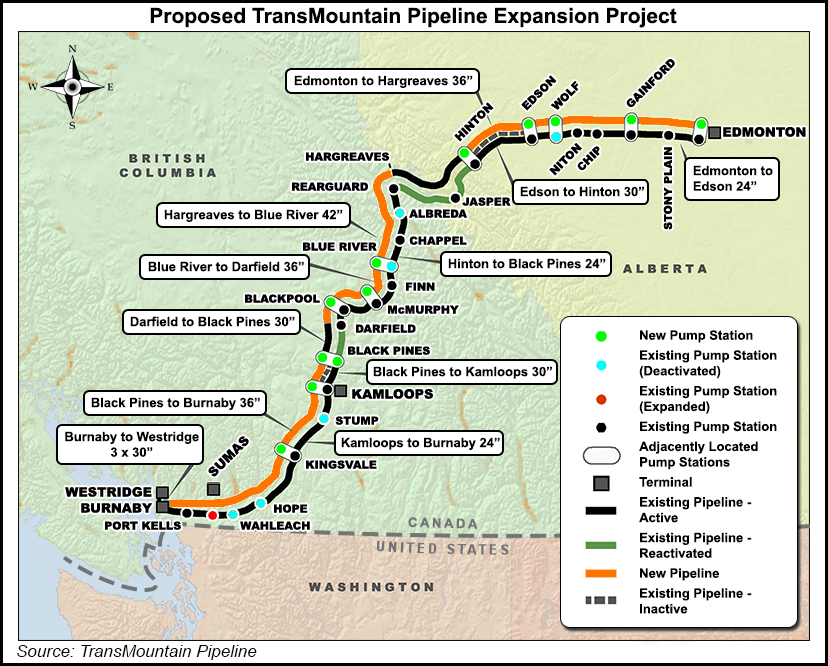Regulatory | NGI All News Access | NGI The Weekly Gas Market Report
Canada’s Bid to Buy Trans Mountain Rejected by Appeals Court
The Canadian government’s decision to buy the Trans Mountain Pipeline is said to be moving forward despite a unanimous ruling Thursday by a federal appeals court, which concluded that the government’s review was flawed and said Indigenous groups had not been adequately consulted.

The Canadian government in May agreed to buy the Kinder Morgan Canada Ltd. (KML) oil pipeline project, at least temporarily, to ensure an oilsands conduit via the Trans Mountain Expansion Project (TMEP) could be built from Alberta to the southern Pacific coast of British Columbia (BC).
Ironically, KML shareholders voted overwhelmingly (99%) Thursday, shortly after the Federal Court of Appeal ruling, to sell the pipeline to the Canadian government.
Up to C$2 billion ($1.6 billion) in public money was committed by the Alberta government as an emergency fund to cover unpredictable expenses, while a Canadian Crown corporation also was being set up to own the pipeline and manage TMEP. The expansion initially was forecast to cost C$7.4 billion ($5.9 billion) to triple capacity to 890,000 b/d.
In its written decision by Justice Eleanor Dawson quashing the approval, the appeals court challenged the National Energy Board’s (NEB) review “on two principal grounds. First, the board’s process and findings were so flawed that the Governor in Council could not reasonably rely on the board’s report; second, Canada failed to fulfil the duty to consult owed to indigenous peoples.”
The case is Tsleil-Waututh Nation v. Canada (Attorney General), No. A-78-17. It combines nearly two dozen lawsuits that called for the NEB’s review of the project to be overturned.
The NEB “made one critical error,” said the three-judge panel. “The board unjustifiably defined the scope of the project under review not to include project-related tanker traffic. The unjustified exclusion of marine shipping from the scope of the project led to successive, unacceptable deficiencies in the board’s report and recommendations.
“As a result, the Governor in Council could not rely on the board’s report and recommendations when assessing the project’s environmental effects and the overall public interest.”
The appeals court said, “Canada acted in good faith and selected an appropriate consultation framework. However, at the last stage of the consultation process prior to the decision of the Governor in Council, a stage called Phase III, Canada’s efforts fell well short of the mark set by the Supreme Court of Canada.
“Canada failed in Phase III to engage, dialogue meaningfully and grapple with the real concerns of the Indigenous applicants so as to explore possible accommodation of those concerns. The duty to consult was not adequately discharged.”
The order has been remitted for appropriate action, “if it sees fit to address these faults and later, proper redetermination,” said the panel.
Canada Finance Minister Bill Morneau, who in May called the government’s C$4.5 billion (US$3.6 billion) agreement an investment in Canada’s future, said Thursday the pipeline remains in the national interest and needs to move forward.
Taken together, the court decision and approval by KML shareholders to sell the pipeline “are important next steps in getting this project built in the right way for the benefit of all Canadians,” Morneau said.
“As we move ahead with the project and the purchase, our government remains committed to ensuring the project proceeds in a manner that protects the public interest. That means ensuring the highest level over governance — including environmental protection. It means upholding our commitments with Indigenous peoples and it means responsibly protecting Canada’s and Canadians’ investment.”
Trans Mountain officials said they were “reviewing the decision” with the Canadian government and “taking the appropriate time to assess next steps. We remain committed to building this project in consideration of communities and the environment, with meaningful consultation with Indigenous Peoples and for the benefit of Canadians.
“Trans Mountain is currently taking measures to suspend construction related activities on the project in a safe and orderly manner. The court decision was not a condition of the transaction between KML and the federal government.”
Indigenous groups and environmentalists that have fought the pipeline were quick to claim victory.
Some BC First Nations welcomed the ruling. “The Squamish Nation celebrates the court’s ruling in favour of our Indigenous rights,” it said.
The court’s decision “is a major victory for Indigenous rights, coastal protection, and the fight to stop our worsening climate crisis,” said Oil Change International’s senior campaigner Adam Scott. “The courts have upheld Canada’s laws in the face of a government unwilling to do the right thing.”
The Trudeau government, he said, “abandoned its promise of reconciliation with Canada’s Indigenous Peoples when it forced this dangerous project on numerous individual, rights-holding First Nations in 2016. Respecting indigenous rights requires ensuring free, prior and informed consent, not continuing Canada’s colonial legacy of privileging extractive industry.”
Halting the project also “keeps open the only credible path for Canada to live up to its obligation to fight climate change,” Scott said. “Building new, long-lived pipelines in support of ever-growing oil production and export is wholly incompatible with the rapid transition away from fossil fuels required.”
Construction of TMEP, now effectively on the shelf indefinitely, tentatively was scheduled to begin this fall with the right-of-way survey completed in Alberta and BC. Pipe was scheduled to begin going into the ground early next year.
KML already has won several victories in court. Earlier in August, the Supreme Court of Canada dismissed an application to overturn a lower court decision by the City of Burnaby near Vancouver, where the pipe would terminate.
© 2024 Natural Gas Intelligence. All rights reserved.
ISSN © 2577-9877 | ISSN © 1532-1266 | ISSN © 2158-8023 |
